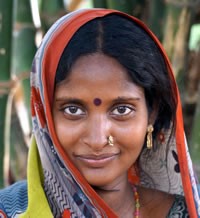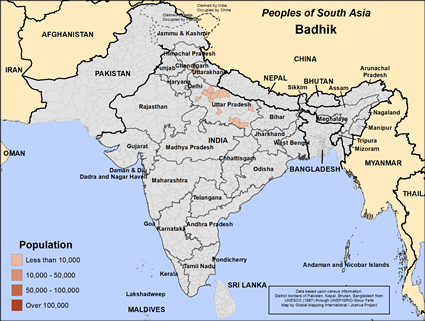Badhik in India

Photo Source:
Copyrighted © 2026
Isudas All rights reserved. Used with permission |

Map Source:
People Group data: Omid. Map geography: UNESCO / GMI. Map Design: Joshua Project
|
| People Name: | Badhik |
| Country: | India |
| 10/40 Window: | Yes |
| Population: | 9,500 |
| World Population: | 9,500 |
| Primary Language: | Hindi |
| Primary Religion: | Hinduism |
| Christian Adherents: | 0.00 % |
| Evangelicals: | 0.00 % |
| Scripture: | Complete Bible |
| Ministry Resources: | Yes |
| Jesus Film: | Yes |
| Audio Recordings: | Yes |
| People Cluster: | South Asia Dalit - other |
| Affinity Bloc: | South Asian Peoples |
| Progress Level: |
|
Introduction / History
The Badhik people live in north central India. Traditionally they hunted animals and trapped birds and sold them for their livelihood. Now they work as butchers and as landless agricultural laborers. The Badhik claim to be Sudras, the fourth level in the Hindu caste system. But the majority of the Hindus treat them as a low class community, a people outside the caste system. The Badhik receive discrimination from society even though it is illegal in India. The Badhik are classified as a scheduled caste which allows them certain government jobs and special places in university admissions.
The main language of the Badhik is Hindi. Many resources are available in Hindi including a complete Bible, radio programs and the JESUS Film. There are few if any Badhik believers.
What Are Their Lives Like?
The Badhik offer their services for the ceremonial slaughter of animals for Hindu holidays. They marry within their community but not within the same clan. Marriage to one spouse is the norm. Badhik tend to have large families. Rural villages often lack access to modern medicine and clean water. Child mortality is high. Children frequently quit school after a few years to help support their families. Being Hindu, they do not eat beef.
Unfortunately, many Badhik are unable to read and write. Some Badhik men receive a secondary education and work in government jobs.
The Badhik make leather items from the hides they tan. Many Badhik who are not butchers or leather workers farm land owned by others. As sharecroppers they are frequently in debt. Some young people are moving from the villages to Indian cities searching for a better life. Since most Badhik lack job skills they are forced to take the lowest paying jobs.
What Are Their Beliefs?
The Badhik people practice Hinduism, the ancient religion of India. Hinduism is a catch-all phrase for the local religions of South Asia, so it is very diverse. At the popular level, Hindus worship and serve the gods of the Hindu pantheon. They visit Hindu temples and offer prayers, food, flowers, and incense to their gods in hopes of gaining protection and benefits. They do not have a personal or familial relationship with their gods like Christians. There are other Hindus who are much more philosophical, especially among the Brahmins.
Almost all Hindus participate in yearly celebrations like Holi, the festival of colors and the start of spring / Diwali, the festival of lights / Navratri, the celebration of autumn / and Rama Navami, Rama's birthday.
What Are Their Needs?
This small, low status caste has a low literacy rate, and virtually no access to the gospel message. The Badhik need good schools and new job skills. Most of all they need to hear and respond to the good news about Jesus Christ. He alone can forgive their sins and give them a sure hope for the future.
Prayer Points
Pray for the Lord will prepare the hearts of the Badhik for the gospel.
Ask the Lord to send Christian workers to the Badhik.
Pray for Holy Spirit to raise up a growing church among the Badhik in this decade.
Pray that Badhik parents will be able to provide for their children.